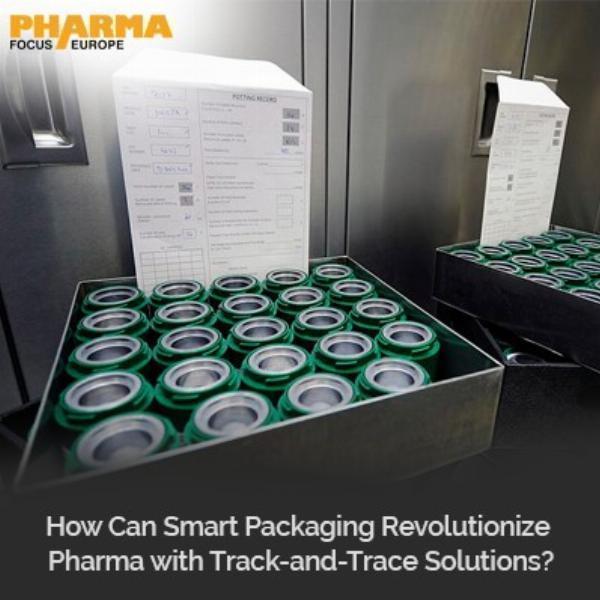How Can Smart Packaging Revolutionize Pharma with Track-and-Trace Solutions?

Strong 8k brings an ultra-HD IPTV experience to your living room and your pocket.
Smart packaging with track-and-trace solutions is revolutionizing the pharmaceutical industry by enhancing supply chain transparency, preventing counterfeit drugs, and improving patient safety. Technologies like RFID, QR codes, and sensors enable real-time visibility, compliance with regulations, and future advancements in IoT, blockchain, and AI for a safer and more efficient industry.
Introduction:
Did you know that smart packaging has the potential to revolutionize the pharmaceutical industry? With track-and-trace solutions, this innovative technology can enhance transparency, safety, and efficiency in the pharma supply chain. Imagine a future where you can easily track the journey of every medication, from production to the patient's hands.
Smart packaging goes beyond traditional packaging functions. It incorporates technologies like RFID, QR codes, and sensors to provide real-time data on the location, condition, and authenticity of pharmaceutical products. This not only helps prevent counterfeit drugs from entering the market but also ensures that patients receive genuine medications.
By implementing track-and-trace solutions, pharmaceutical companies can have full visibility of their supply chain, enabling them to identify and rectify inefficiencies. It also helps in streamlining product recalls and minimizing waste. Furthermore, smart packaging can provide patients with important information about dosage, storage, and expiration dates, ensuring proper medication adherence.
I. Benefits of implementing smart packaging and track-and-trace solutions
Smart packaging and track-and-trace solutions offer numerous benefits for the pharmaceutical industry. Firstly, it enhances supply chain visibility, allowing companies to track the movement of medications at every stage. This enables efficient inventory management, reduces the risk of stockouts, and ensures timely delivery to patients. Additionally, it helps in identifying and eliminating bottlenecks in the supply chain, leading to improved efficiency and cost savings.
Secondly, smart packaging enhances patient safety by minimizing the risk of counterfeit drugs. With track-and-trace solutions, pharmaceutical companies can verify the authenticity of their products and ensure that patients receive genuine medications. This not only protects patients from potentially harmful counterfeit drugs but also safeguards the reputation of pharmaceutical brands.
Thirdly, smart packaging improves medication adherence by providing patients with important information about dosage, storage, and expiration dates. This ensures that patients take their medications correctly and at the right time, leading to better health outcomes. Moreover, smart packaging can also include reminders and alerts to help patients stay on track with their medication regimens.
II. Current challenges in the pharma industry and how smart packaging can help overcome thempharma industry
The pharmaceutical industry faces various challenges, including counterfeit drugs, supply chain inefficiencies, and medication non-adherence. Smart packaging with track-and-trace solutions can help overcome these challenges in several ways.
Counterfeit drugs pose a significant threat to patient safety and the pharmaceutical industry as a whole. By implementing smart packaging with track-and-trace solutions, pharmaceutical companies can authenticate their products and ensure that patients receive genuine medications. This technology enables the verification of product authenticity at each step of the supply chain, preventing the entry of counterfeit drugs into the market.
Supply chain inefficiencies, such as delays, stockouts, and waste, are common challenges for pharmaceutical companies. Smart packaging and track-and-trace solutions provide real-time visibility into the movement of medications, enabling companies to identify and rectify inefficiencies. By streamlining the supply chain, smart packaging reduces costs, improves inventory management, and ensures timely delivery of medications to patients.
Medication non-adherence is a major concern in healthcare, leading to poor health outcomes and increased healthcare costs. Smart packaging can address this challenge by providing patients with important information about their medications, including dosage instructions, storage requirements, and expiration dates. This helps patients adhere to their medication regimens and improves overall patient health.
III. Key features and technologies used in smart packaging and track-and-trace solutions
Smart packaging incorporates various features and technologies to enhance transparency and security in the pharmaceutical supply chain. Some of the key features include:
RFID (Radio-Frequency Identification) tags: These small electronic devices can be embedded in packaging to track and identify products throughout the supply chain. RFID tags can store and transmit data, allowing pharmaceutical companies to monitor the movement of medications in real-time.
QR (Quick Response) codes: These codes can be scanned using smartphones or dedicated scanning devices to provide information about the product, including its origin, expiration date, and authenticity. QR codes offer a convenient and cost-effective way to track and trace pharmaceutical products.
Sensors: Some smart packaging solutions incorporate sensors that can monitor temperature, humidity, and other environmental conditions. This helps in ensuring the quality and integrity of medications, especially those that are sensitive to environmental factors.
Tamper-evident packaging: Smart packaging can include tamper-evident features that indicate if the package has been opened or tampered with. This enhances product safety and prevents the distribution of counterfeit or adulterated drugs.
IV. Regulatory requirements and compliance for smart packaging and track-and-trace solutions
The implementation of smart packaging and track-and-trace solutions in the pharmaceutical industry is subject to regulatory requirements and compliance standards. These regulations aim to ensure patient safety, prevent counterfeit drugs, and maintain the integrity of the supply chain.
In the United States, the Drug Supply Chain Security Act (DSCSA) mandates the use of track-and-trace solutions in the pharmaceutical industry. It requires pharmaceutical companies to implement systems that can track and trace prescription drugs throughout the supply chain, from manufacturer to dispenser. Similar regulations exist in other countries, such as the European Union's Falsified Medicines Directive (FMD).
Compliance with these regulations involves implementing technologies like RFID, QR codes, and tamper-evident packaging. Pharmaceutical companies must also establish processes to authenticate products, verify the integrity of the supply chain, and report any suspicious activities or deviations.
Read more: https://www.pharmafocuseurope.com/articles/how-can-smart-packaging-revolutionize-pharma-with-track-and-trace-solutions
Follow us:
Facebook https://www.facebook.com/PharmaFocusEurope
LinkedIn https://www.linkedin.com/company/pharmafocuseurope/
Twitter https://x.com/pharma_eu
Instagram https://www.instagram.com/pharmafocuseurope/
Pinterest https://in.pinterest.com/Pharmafocuseurope/
Note: IndiBlogHub features both user-submitted and editorial content. We do not verify third-party contributions. Read our Disclaimer and Privacy Policyfor details.


